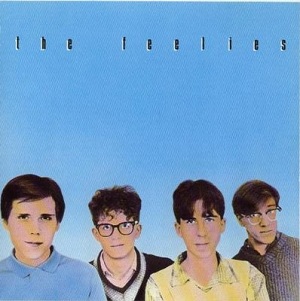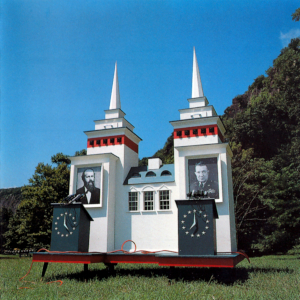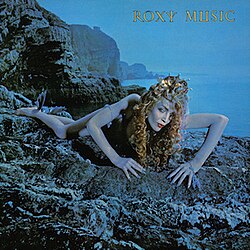Around the same time Stephen Malkmus and the Jicks released Real Emotional Trash, critics were deriding fellow ‘90 wunderkind Wes Anderson for straying too far from making the kind of emotional work like Rushmore and The Royal Tenenbaums that made him famous to go up own ass making impeccable dioramas for the lukewarmly received pastiches Life Aquatic and Darjeeling Limited. Anderson responded by clearing his palette with an adaptation (Roald Dahl’s Fantastic Mr. Fox) and returning somewhat to his roots with the bildungsroman Moonlight Kingdom, before blasting so far up his own up ass that he came out the other side with The Grand Budapest Hotel, a movie that has all the elaborate set dressing, meticulously matched shots, narrative curlicues, surface flash, and diorama bullshit that critics were lambasting him for, but wedded to an emotionally compelling story with a heady themes (how to respond to encroaching fascism, the passage of one era into the next) and lovably unique characters. It’s his most successful film since his beloved early ones.
While the 2000’s critics weren’t necessarily as down on Stephen Malkmus as they were on Anderson, I think there was still a concern that for someone who got famous as the leader of the slacker pack Pavement, Malkmus was actually quite the control freak, and he would ratchet his formerly sloppy music so tightly he would suck the energy from it.
Reviewing 2003’s Pig Lib, Malkmus’s second solo album, Robert Christgau called him a “fussbudget,” and Stephen Thomas Erlewine wrote for Allmusic.com, in his most negative review of any Malkmus project, “part of what made him so much fun was his rough edges, jokes, mistakes, throwaways, and indulgent whims, all of which are sadly missing here.” I think a lot of fans were concerned that the brains behind their favorite band of the 1990s was going to turn towards airless adult contemporary rock.
Honestly, having listened to Pig Lib this week, I would be surprised if it’s anyone’s favorite Malkmus album. It has the patented Makmus moves – track one begins with a false start, there’s rhymes that come dangerously close (without quite tipping) into nonsense, and he doot-doo-doos along with the lead guitar – but it does feel a little stiff. Part of this is the songs (which are conservative for Malkmus), part of this is the production, and part of it is the Jicks, who, though capable of following Malkmus where Pavement often wouldn’t (or couldn’t) go, sound a bit tentative – especially drummer John Moen.
Yet, in retrospect, Pig Lib seems less like a break from what Malkmus was going before than, like Anderson with Life Aquatic and Darjeeling Limited, an adjustment to working on a bigger canvas AS A MATURING ARTIST.
I think most people who are compelled to make art begin with a reservoir of inspiration. But after writing a hundred or so songs, releasing three or four films, or publishing two or three novels that reservoir starts running dry – which is unfortunate because it tends to coincide with when artists start getting technically good at expressing their vision. It’s this period that separates the lifers from the dilettantes. If you’ve burned through your initial well of inspiration, your emotional impulse to create art, what compels you to make make more of it? Malkmus and Anderson answered in the same way. They decided to recreate the past through their own unique lenses.
For Anderson that past is pre-WWII Eastern Europe (The Grand Budapest Hotel), late 60’s France (The French Dispatch), and Space Age Southeastern US (Asteroid City). And, oh yeah, and he did that one about Japanese dogs.
For Makmus, that past is the 1970s. On 2020’s Traditional Techniques, he does his twisted version of Laurel Canyon pop. On 2019’s Groove Denied, he does his take on early industrial bands like Throbbing Gristle and Chrome. On 2008’s Real Emotional Trash, he remakes guitar rock of the early ‘70s. He puts Harry Nilsson, Yes, AM Gold, and The Spiders From Mars in the blender, adds his own special sauce, and comes out with something bizarre and wonderous.
The lengthy “Real Emotional Trash” and “Elmo Delmo” are as close as Makmus ever gets to ‘70s hard rock grandeur, slabs of Wings and Floyd. “Hopscotch Willie” is a syncopated jam in the vein of Santana and The Stones’ “Can You Hear Me Knockin’”, but it also devolves into an atonal trip down a solo piano and finds Malkmus singing the lowest note he ever recorded. For more than a moment, you could mistake “Out of Reaches” for Three Dog Night. And most of “Baltimore” is a traditional-style waltz that would be at home on a Fairport Convention record, if not for all the squirrelly electric guitar.
“Gardenia” is straight up sunshine pop, as if The Raspberries gave a prominent shout-out to photographer Richard Avedon. It also includes the most Malkmusian chorus: “Well you are a gardenia/ Pressed in a campaign journal/ In the rucksack of an Afrikaner candidate for mild reform,” which, now that I think of it, also seems like a line from a Wes Anderson movie.
Opener “Dragonfly Pie,” the album’s most original track, begins with a Sabbath-worthy, stomping minor key verse, before opening into a major key chorus with…is that marimba? It’s also our introduction to Sleater-Kinney’s Janet Weiss as a Jick. Her chaotic chops are the perfect compliment to Malkmus’s offbeat ‘70s rock.
If the concern with Pig Lib was that Malkmus would become less adventurous – less fun – as a musician, he allayed those concerns with 2005’s Face the Truth, a truly solo endeavor that found Malkmus goofing around with synthesizers and making his most joyous music since the early Pavement days. However, just like Anderson proved that he could still make meaningful art and pretentious dioramas at the same time with The Grand Budapest Hotel, Malkmus proved he could be a fussbudget bandleader and still have a good time with Real Emotional Trash.







